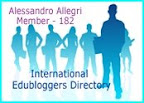Translation of post "Wiki e blog" of March 17th 2008 on "Il deserto dei tartari 2.0".
In this wiki I found interesting ideas worth sharing.
Blog (from
web log). An online diary where the writer (or writers) post articles or columns that are reachable, according to the settings, by anybody or by a selected group of users, and where readers (or a portion of them) can post comments taking part in a discussion. This site is a (rather poor, at present) example of a blog.
Wiki (from hawaiian, "quick", "fast"). It is a collection of structured information reachable by a set of people who can modify, edit, add to, the site's contents. Wikipedia is a (gigantic) example of a wiki.
What follows is just some night babbling of mine with no real supporting facts.
What educational uses could I find for these two lead characters of Web 2.0? The former is surely advisable for discussions, creative writing, somehow for any kind of activity where exchange and dialogue are central. Because of the journalistic form and the sequential line of posts, I think a blog could be useful for building individual distinct knowledges through sharing and discussing.
The latter is more useful in situations where there is a final goal to reach through successive approximations and in a collaborative way. Since many wiki services also offer discussion tools (for example about what a user modified), a wiki can be useful for cumulatively increasing a single unifiable collective knowledge, without a central role of chronology.
Focusing on the role of time, I notice a substantial duality of the two media: a wiki is a synchronic glance on a knowledge that is growing diachronically. A blog is a diachronic glance on different knowledges growing synchronically.
Focusing on the central element and the type of knowledge involved, a wiki is object-centered, and the object is singular (meaning that the content of a wiki is only one), whereas a blog is process-centered, and the process is plural (meaning that the knowledge-building processes are as many as the people involved).
 Italian version
Italian version




